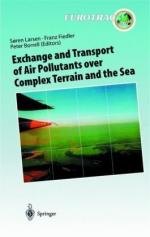|
This section contains 772 words (approx. 3 pages at 300 words per page) |

|
Atmospheric pollution (also commonly called air pollution) is derived chiefly from the spewing of gasses and solid particulates into the atmosphere. Many pollutants—dust, pollen, and soil particles—occur naturally, but most air pollution, as the term is most commonly used and understood, is caused by human activity. Although there are countless sources of air pollution, the most common are emissions from the burning of hydrocarbons or fossil fuels (e.g., coal and oil products). Most of the world's industrialized countries rely on the burning of fossil fuels; power plants heat homes and provide electricity, automobiles burn gas, and factories burn materials to create products.
Air pollution is a serious global problem, and is especially problematic in large urban areas such as Mexico City, Mexico, and Athens, Greece. Many people suffer from serious illnesses caused by smog and air pollution in these areas. Plants, buildings, and...
|
This section contains 772 words (approx. 3 pages at 300 words per page) |

|


